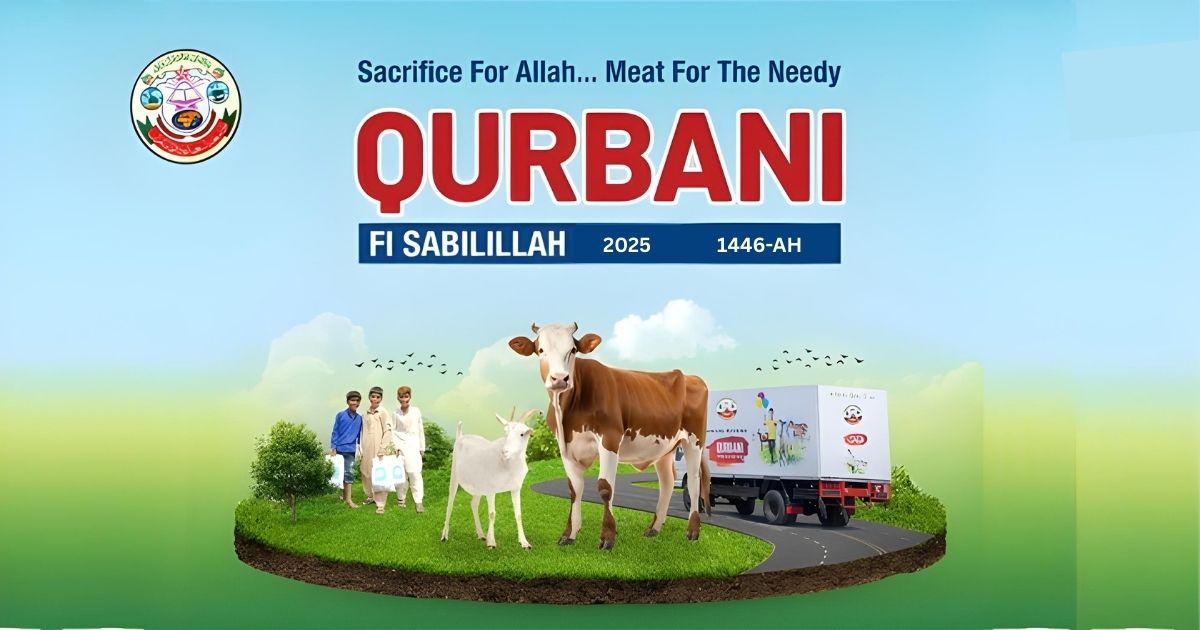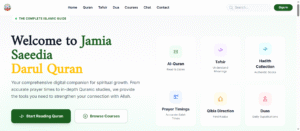Introduction
Welcome to Jamia Saeedia Darul Quran comprehensive guide on Ijtamai Qurbani 2025. This article aims to provide you with all the information you need to understand the significance, process, and benefits of participating in Ijtamai Qurbani. Whether you are a seasoned participant or new to this noble act, this guide will help you navigate through the essentials and ensure you make the most out of this sacred practice.
Read More: Bakra Eid 2025
Understanding Ijtamai Qurbani
What is Ijtamai Qurbani?
Ijtamai Qurbani, also known as collective sacrifice, is a practice where multiple individuals or families come together to perform the act of Qurbani. This collective effort not only fulfills the religious obligation but also fosters a sense of community and unity among Muslims. The concept is rooted in the Islamic tradition of sharing and caring for one another, especially during the blessed days of Eid ul-Adha.
The Significance of Qurbani
Qurbani is an essential pillar of Islam that commemorates the willingness of Prophet Ibrahim (AS) to sacrifice his son Ismail (AS) as an act of obedience to Allah. This act of devotion is remembered and reenacted by Muslims worldwide through the sacrifice of an animal, typically a goat, sheep, cow, or camel. The meat from the sacrificed animal is then distributed among the needy, relatives, and friends, symbolizing the spirit of sharing and compassion.
The Benefits of Ijtamai Qurbani
Spiritual Benefits
Participating in Ijtamai Qurbani brings numerous spiritual benefits. It is a means of seeking Allah’s pleasure and forgiveness. The act of sacrifice purifies the heart and soul, instilling a sense of humility and gratitude. Moreover, it strengthens the bond between the participants and the community, fostering a spirit of brotherhood and unity.
Social Benefits
Ijtamai Qurbani has significant social implications. It ensures that the meat from the sacrificed animals reaches a larger number of people, especially those who are less fortunate. This collective effort helps in addressing food insecurity and ensures that the needy are not left out during the festive season. Additionally, it promotes social cohesion and harmony within the community.
Economic Benefits
From an economic perspective, Ijtamai Qurbani is a cost-effective way to fulfill the religious obligation. By pooling resources, participants can share the cost of the animal, making it more affordable for everyone involved. This collective approach also supports local farmers and butchers, contributing to the local economy.
Preparing for Ijtamai Qurbani 2025
Choosing the Right Animal
Selecting the right animal for Qurbani is crucial. The animal must be healthy and free from any defects. The types of animals that can be sacrificed include goats, sheep, cows, and camels. Each animal has specific age and health requirements that must be met to ensure the sacrifice is acceptable.
Forming a Group
Forming a group for Ijtamai Qurbani involves bringing together like-minded individuals who share the same intention and commitment. It is essential to ensure that all participants are aware of the rules and regulations governing Qurbani. The group can be formed among family members, friends, or even community members.
Ensuring Halal Slaughter
The slaughtering process must adhere to Islamic principles to ensure the meat is halal. This includes reciting the name of Allah before slaughtering, using a sharp knife, and ensuring the animal is treated humanely. It is advisable to seek the services of a professional butcher who is well-versed in Islamic slaughtering practices.
The Day of Ijtamai Qurbani 2025
Morning Rituals
On the day of Ijtamai Qurbani, Muslims wake up early to perform the following rituals:
- Ghusl: Take a bath to ensure cleanliness and purity.
- Wear New Clothes: Dress in your best attire to mark the occasion.
- Eid Prayer: Attend the Eid prayer, which is usually held in an open area or a large mosque. The prayer is followed by a sermon that highlights the significance of the day.
The Sacrifice (Qurbani)
The sacrifice is the most important part of Ijtamai Qurbani. Here are the steps to follow:
- Intention (Niyyah): Make the intention to sacrifice the animal in the name of Allah.
- Facing the Qiblah: Ensure the animal is facing the Qiblah (the direction of the Kaaba in Mecca).
- Recite the Takbir: Say “Bismillah, Allahu Akbar” before performing the sacrifice.
- Humane Treatment: Ensure the animal is treated humanely and that the sacrifice is performed quickly and painlessly.
- Distribution of Meat: The meat from the sacrificed animal is divided into three parts: one for the family, one for relatives and friends, and one for the poor and needy.
Celebrations and Festivities
After the sacrifice, families and communities gather to celebrate Ijtamai Qurbani. Traditional activities include:
- Feasting: Enjoy a delicious meal with family and friends, featuring dishes made from the sacrificed animal.
- Visiting Relatives: Exchange greetings and gifts with loved ones.
- Charity: Donate to the less fortunate, ensuring that everyone can partake in the festivities.
Common Questions about Ijtamai Qurbani
Who Can Participate in Ijtamai Qurbani?
Any Muslim who is financially capable can participate in Ijtamai Qurbani. It is an inclusive practice that encourages community involvement and cooperation.
What Happens to the Meat?
The meat from the sacrificed animal is divided into three parts: one for the family, one for relatives and friends, and one for the poor and needy. This ensures that the blessings of Qurbani are shared with the community.
Is Ijtamai Qurbani Mandatory?
While Qurbani is a highly recommended act of worship, it is not mandatory for those who cannot afford it. However, participating in Ijtamai Qurbani allows individuals to fulfill their religious obligation collectively, making it more accessible.
The Process of Ijtamai Qurbani
Day of Sacrifice
The day of sacrifice, typically the 10th of Dhu al-Hijjah, is a day of great significance. Participants gather early in the morning, perform the Eid prayer, and then proceed with the sacrifice. The atmosphere is filled with a sense of devotion and unity as everyone comes together to fulfill this noble act.
Distribution of Meat
After the sacrifice, the meat is distributed into three equal parts: one for the family, one for relatives and friends, and one for the needy. This distribution ensures that the blessings of Qurbani are shared widely, promoting a sense of community and compassion.
Post-Qurbani Activities
Following the distribution of meat, participants often engage in various activities to celebrate the occasion. This includes visiting family and friends, exchanging gifts, and participating in community events. These activities further strengthen the bonds within the community and create lasting memories.
The Role of Jamia Saeedia Darul Quran
Our Mission
At Jamia Saeedia Darul Quran, our mission is to promote Islamic values and practices through education and community engagement. We strive to provide a platform where Muslims can come together to fulfill their religious obligations and contribute to the betterment of society.
Our Services
We offer a range of services to facilitate Ijtamai Qurbani 2025. This includes:
- Guidance and Support: Our team of scholars and experts is available to provide guidance on the rules and regulations of Qurbani.
- Group Formation: We assist in forming groups for Ijtamai Qurbani, ensuring that all participants are well-informed and committed.
- Halal Slaughtering: We collaborate with professional butchers to ensure the slaughtering process is halal and adheres to Islamic principles.
- Meat Distribution: We coordinate the distribution of meat, ensuring it reaches the needy and deserving members of the community.
Conclusion
Ijtamai Qurbani 2025 is an opportunity to fulfill a religious obligation while fostering a sense of community and unity. At Jamia Saeedia Darul Quran, we are committed to providing you with the support and guidance needed to make this noble act a meaningful and rewarding experience. Join us in this collective effort to seek Allah’s pleasure and contribute to the betterment of society.
Frequently Asked Questions (FAQs)
What is the minimum age for the animals to be sacrificed?
The minimum age for goats and sheep is one year, for cows is two years, and for camels is five years. The animal must be healthy and free from any defects.
Can I perform Qurbani on behalf of someone else?
Yes, you can perform Qurbani on behalf of someone else, such as a deceased family member or someone who is unable to perform it themselves.
What should I do with the hide of the sacrificed animal?
The hide of the sacrificed animal can be donated to charitable organizations or used for personal purposes. It is advisable to ensure that the hide is utilized in a manner that benefits the community.



Leave A Comment